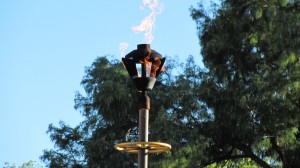
By Brad Crofford, Editor-in-chief
The cabinet answered students’ questions on Thursday, November 15 in the Heritage Room during this semester’s only Cabinet Chat. Students had previously submitted questions online through SGA’s website (snusga.com).
The first question involved why the lamp of learning is still burning. In the past it has typically only been on during the earliest portions of the semester. The current plan is to keep it lit throughout the academic year and turn it off during the summer, Dr. Scott Strawn, VP for Financial Affairs, explained. They estimate this will cost about $3,000 as natural gas prices are lower than in the past
“It’s one of the things we do to remember this is a special place,” Strawn said.
Academics:
Several questions involved academics. One question involved the possibility of having a “dead week” in the spring. Though there are various definitions, a dead week typically involves either having no assignments and/or no class in the days leading up into finals week. Dr. Mary Jones, provost, expressed reservations about such a time.
“We need to have a conversation with a broader group of faculty,” Jones said. “One of my concerns is that it will just push the crunch time a week earlier…There are good pedagogical reasons for having comprehensive assignments due at the end of the semester.”
Blake Jordan, one of two student representatives on the academic council, said there would be pros and cons to having a dead week. In terms of pros, he said “It would give students a chance to focus on finals.” However, in terms of cons, he said “Students, instead of focusing on finals, may just take it as a social time.” He also said that work might just pile up at the end.
Another academic question involved the grading scale, specifically the lack of an A+. Jones noted that SNU’s current system, which includes pluses and minuses but does not include an A+, is shared with highly-reputed institutions like Harvard as well as the rest of the Nazarene universities.
“A four-point [4.0 GPA] on this scale is far more meaningful and impressive,” Jones said. “My concern with an A+ system is grade inflation…We agreed as an academic council not to take any action at this point.”
The Commons:
A question asked if anything could be done to improve cell phone reception on the ground floor of the Commons.
“It’s a $12,000-15,000 fix,” Strawn said, explaining that the current focus is on science, including the Campaign for the Sciences. “It is on the list. We’ve priced it down to the vendor…I’d like to think that in time we’ll be able to get to it.”
A question regarding whether anything could be done to allow commuter students to bring a packed lunch into Sodexo to eat with friends generated good discussion. Dr. Mike Redwine, VP for Student Development, liked the idea and said he would bring it up with Sodexo’s management.
“I think it’s a great idea, but I haven’t had the chance to visit with Sodexo about it,” Redwine said.
He did note some potential challenges, such as since the food area is open, there would be the potential for people to steal food. Jones suggested eating meals together in Pops as an alternative for commuters. Strawn framed the issue from a pricing perspective, asking the students in attendance “What price would draw commuters to Sodexo to buy lunch?”
Sodexo was also the focus of another question. This one asked if there could be a pay-as-you-go meal plan, given that there are students with special dietary needs.
Redwine explained that this type of issue is contracted with Sodexo and that greater participation leads to lower costs for students.
“The reason it’s as inexpensive as it is is because we’re all doing it,” Redwine said. “The more students on a plan, the less expensive it would be for all of us.”
He also noted that Sodexo has done a good job of keeping costs down this year, which has kept students from paying more relative to previous years. Strawn noted that the university is not profiting off of meal plans.
Other topics dealt with included why the TVs in the Commons are on during breaks, students’ options for playing instruments, limiting commuter lunch announcements to only commuter students, and whether there could be a marching band, the feasibility of a rock climbing wall, and the potential for lights on the south side of Bracken.
Would a dead week be beneficial? Should SNU reconsider its grading scale? Sound off in the comments below.
In my opinion, it sounds to me like the $3,000 cost fo having the lamp burn is being dimmed down to sound like it is a measly 3000.00 versus “X” amount being spent here and there. If we are talking money though, it is important to think of the amount being spent on short and long terms. If we are spending $3,000 to have the lamp of learning burning throughout the school year, what could we, as a school, have invested that money in if we were looking at it in terms of five or ten years. Would this not be a good way to save for better desk in the religion building, or perhaps, serve as an up keeping to the many problems we face each year in maintenance. My point is that we cannot just say that it is natural gas and is only $3,000 because with the many humanitarian projects we have around campus and our community, we could be putting it to better use.